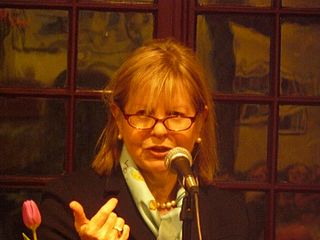A Quote by Jean M. Auel
You learn to write by writing, and by reading and thinking about how writers have created their characters and invented their stories. If you are not a reader, don't even think about being a writer.
Related Quotes
Two kinds of reading can be distinguished. I call them reading like a reader and reading like a writer ... when you read like a reader, you identify with the characters in the story. The story is what you learn about. When you read like a writer, you identify with the author and learn about writing.
I learned to write from reading. I had no writing classes. It's part of my thinking as the writer-author, reading, but then I also want to bring this into my characters, who also read and think. There's that great quote from Virginia Woolf - it's very simple: "...books continue each other." I think when you're a writer, you're also, hopefully, a reader, and you're bringing those earlier works into your work.
I really don't watch enough TV to know about the impact. In my experience as a TV writer, I would say is the exact opposite - it's very constricted, all having to conform to a form. My sense of fiction writing is not to think about rules but to be driven by the characters and their stories. I often ask myself what's at risk here, who needs what, and how are they going to get it. There has to be a reason for the reader to stop living their own life and start reading your book.
You know, my problem with most screenwriting is it is a blueprint. It's like they're afraid to write the damn thing. And I'm a writer. That's what I do. I want it to be written. I want it to work on the page first and foremost. So when I'm writing the script, I'm not thinking about the viewer watching the movie. I'm thinking about the reader reading the script.
Even my colleagues don't read classic criticism. And my feeling is that if you don't do that then you're not really practicing your craft. That's how you learn how to do it. You don't learn how to write about jazz just from listening to jazz. You learn how to write by reading the great writers and how they worked, the great music critics.
I must suppose that reading wonderful writers may, inadvertently, teach an avid reader a great deal -- not only about life and other matters, but about how to write. Therefore doubtless I have benefited from frequent immersions in the glowing genius of others. It would be nice to think so. (I do actually think so). But to improve my skills will never be the prompting force of my reading -- that's just literary lust.
But it's hard for me to pinpoint where all my characters and dialogue come from - imagination or real life. My memoir, of course, was all about my past, and many of the short stories cleave very closely to my life, but the more stories I wrote in the collection, the more that seemed to be invented, but who knows... I think I'm writing about a young woman with acne who shoplifts, but I'm really writing about myself.
Politics becomes a part of a writer's working life. The writer's protagonists are born in the context of the feelings that this atmosphere evokes. How can writers separate themselves from these feelings and create protagonists that come from Mars? Even writers who only write about psychological or internal issues or about love are writing under their prevailing atmosphere, and their writings will take on the hue of the time, place, and mood of their environment.
I'm a writer, not an editor, and though the editing rarely cut into my writing time, it did take away from that walking-around-thinking-about-it-when-you're-not-thinking-about-it time that I think is important for writers. When you're half-thinking about what you're working on while driving, cooking . . . just letting things sift and settle, come to you.
When I was thinking about these women characters, no matter how bad a person I am - a bad writer, my limitations, my sexism, you know - the thought was, it would be useful as a writer to try to create a template for all the male writers, especially Dominican male writers, especially males of color, of how a writer can use seeing to create more nuanced representations of women.






































